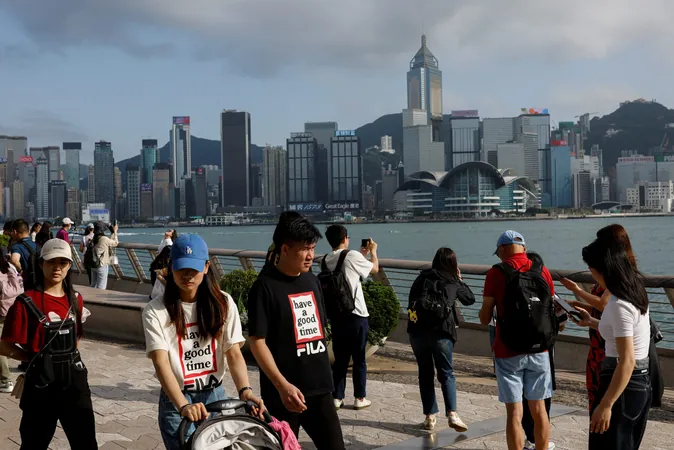
Hong Kong: The New Gateway for MENA Investments in Asian Innovation!
2025-09-04
Author: Kai
Middle East Investors Flock to Asia
As Western investors pull back from China, a new wave of capital is surging into Asia from the Middle East and North Africa (MENA). While foreign direct investment in China plummeted by 29% last year, MENA sovereign funds have remained undeterred, injecting over $9.5 billion into the region. This financial shift points to one city in particular that stands to gain immensely: Hong Kong.
Why Hong Kong Stands Out
You might wonder why Hong Kong is the star of the show. Renowned worldwide as a financial juggernaut, Hong Kong handles a staggering two-thirds of China’s foreign direct investment and is the gateway for business connections within Asia. Its unique linkages with both China and the ASEAN region make it the ultimate hotspot for MENA capital seeking exposure in the Asia-Pacific.
A Thriving Financial Ecosystem
Hong Kong's close relations with both Chinese and Southeast Asian enterprises highlight its competitive edge. Recently, Hong Kong’s Chief Executive, John Lee, noted that the city hosts around 650 ASEAN companies, with 50 new additions this year alone! This is a testament to its enduring appeal as a hub for international commerce.
Moreover, the Hong Kong Stock Exchange is the top choice for overseas listings among ASEAN firms, solidifying its role as a global connector.
Building Bridges with MENA Leaders
Hong Kong is actively nurturing ties with the MENA region. Chief Executive Lee’s recent delegation trips included over 30 business leaders and entrepreneurs from mainland China, all aiming to foster tech innovation and collaboration. Their travels resulted in signing 59 agreements designed to strengthen economic ties with Gulf countries.
Alluring Investment Climate
What makes Hong Kong even more attractive are its transparent regulations, minimal restrictions on foreign investment, low corporate tax rates, and knowledgeable policymakers familiar with Islamic finance. This robust framework encourages MENA family offices to interlace into Hong Kong's vibrant financial fabric.
A Booming Tech Corridor
With 2,700 family offices already basing their operations in Hong Kong, the government aims to add 200 more by the year's end, with MENA family offices at the forefront of this initiative. Recent collaborations, like the partnership between Hong Kong Science and Technology Parks and Saudi Arabia’s Beta Lab, enable startups to access significant funding while creating a dynamic tech ecosystem.
Sector-Specific Opportunities on the Rise
The collaboration between MENA and Hong Kong is ushering in opportunities across various sectors, especially fintech. With a projected market size of $606 billion by 2032, the Hong Kong fintech landscape is ripe for investment, and MENA investors are increasingly tapping into this lucrative market.
Several Hong Kong fintech startups are already expanding into MENA, including partnerships with entities in Dubai, illustrating the growing momentum of these cross-border initiatives.
Green Tech Gains Traction
In an era focused on sustainability, MENA investors remain committed to green technology, pouring $3.6 billion globally into climate tech in 2024. Hong Kong's initiatives like the Green Tech Fund create fertile ground for future investments in sustainable solutions.
Strategic Future Planning for Hong Kong
As MENA investors become more active in global markets, Hong Kong has a prime opportunity to seize a larger chunk of that capital flow. Strategic partnerships and expanded representation in MENA can help promote Hong Kong's advantages to startups looking to enter Asian markets.
The reallocation of capital on a global scale signifies a transformative shift in financial paradigms. As Western firms step back from China, Hong Kong’s role as a bridge connecting Middle Eastern wealth with opportunities in both China and ASEAN may well define the next evolution of MENA-Asia investment.
The Path Ahead: Hong Kong as an Investment Hub
Ultimately, how Hong Kong responds to these emerging trends will determine its future as the central node of the new financial corridor linking MENA and Asia. Will it rise to the occasion and capture the burgeoning opportunities ahead? Only time will tell!






 Brasil (PT)
Brasil (PT)
 Canada (EN)
Canada (EN)
 Chile (ES)
Chile (ES)
 Česko (CS)
Česko (CS)
 대한민국 (KO)
대한민국 (KO)
 España (ES)
España (ES)
 France (FR)
France (FR)
 Hong Kong (EN)
Hong Kong (EN)
 Italia (IT)
Italia (IT)
 日本 (JA)
日本 (JA)
 Magyarország (HU)
Magyarország (HU)
 Norge (NO)
Norge (NO)
 Polska (PL)
Polska (PL)
 Schweiz (DE)
Schweiz (DE)
 Singapore (EN)
Singapore (EN)
 Sverige (SV)
Sverige (SV)
 Suomi (FI)
Suomi (FI)
 Türkiye (TR)
Türkiye (TR)
 الإمارات العربية المتحدة (AR)
الإمارات العربية المتحدة (AR)